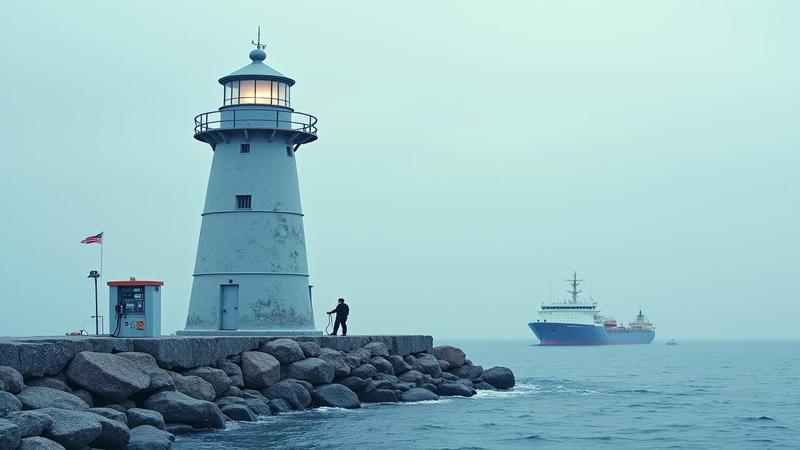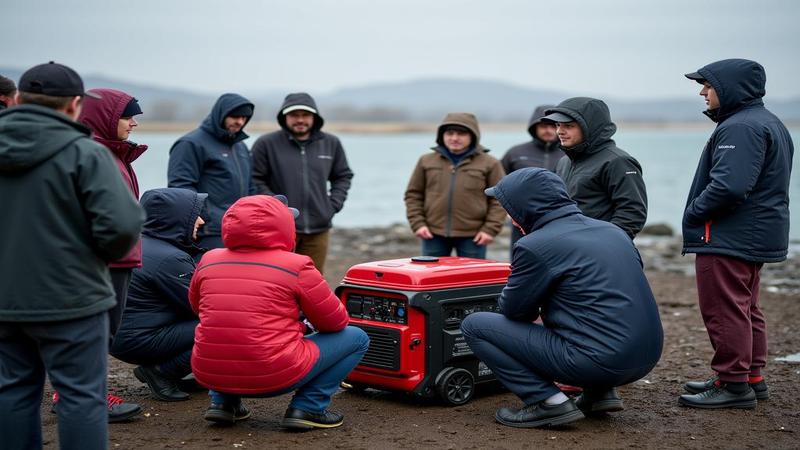Kuril Islands Run Dry as Policy Wheels Fall Off

Gas has become the new weather across the Kuril archipelago, where the horizon is a rumor and the gas pump a myth. The islands’ daily life now runs on a timetable that begins with the question of whether engines will grin or grimace. I, Arden Lowell, file dispatches from a dock where policy feels more like wind than law.
Local officials describe the shortage in guarded terms, as if it were a seasonal shortage of public patience. The reality is simpler: a long queue, a creaking generator, and the sense that someone somewhere is dialing down the power for reasons beyond comprehension. My notebook, once a ledger of schedules, now tracks the mood of the harbor like a mood ring.
Ships arrive on time in rumor, not in fuel. Fishermen swap stories about shipments that were promised for yesterday and sailed for tomorrow. The gas crisis has become a cultural event, a weather pattern that wears a bureaucratic suit.
Crossings carry their own anxiety, as any day without fuel becomes a test of endurance and polite small talk. A bus coughs to life only to sneeze out a wheeze of exhaust that smells like compromise. The local newspaper runs a serialized mystery: The Case of the Missing Gasoline which, in fairness, is also the town’s longest running soap.
The air holds a thinner bite, and people joke about multiplying candles instead of kilowatts. In the market, someone advertises a solar lamp as the latest luxury, a luxury governed by daylight. Children count the number of buses that make it to school and vote with their shoulders when the answer is zero.
Officials insist this is a temporary lull, a weather pattern that will pass once someone signs the right paper. They speak in the cadence of a machinery manual, promising improvements that require more documents than actual energy. Residents cope by sharing rides, sharing stories, and sharing memories of when the tanks were full.
At the port, a crane clanks with the rhythm of a tired metronome and acts as both spectator and critic of policy. Customs officers trade jokes about shipments delayed by paperwork while the sea keeps its own count of days with engines off. People drift from stall to stall like actors in a slow farce staged by global markets.
From the shoreline to the checkpoint, the community practices diplomacy with a smile and a shrug. My notebook records footsteps, sighs, and the occasional shrug that travels faster than a press release. It is policy weather, and we are all dressed in raincoats labeled Temporary.
Still, resilience is a commodity, and someone is hawking optimism by the liter at the makeshift market. I watched a resident rummage for a ‘portable solar-powered heater’ at the local bazaar, a sign that resilience is now a shopping category.
Analysts in warm offices insist the gap will be bridged by clever logistics and a dash of geopolitical theater. They talk of diversions, alignments, and the hope that a update to the supply chain will arrive by the next ferry. In practice, the ferry arrives with a sigh and a bag of apologies.
Fishermen tie knots that could double as economic forecasts, promising that each engine start is a vote of confidence in tomorrow. The harbor agrees with a chorus of idling engines and polite yawns. Even the gulls seem to understand more about supply than the officials on the pier.
On official feeds the language is pristine, verging on poetry about ‘operational continuity’ and a ‘targeted tolerance’ for delay. The real-life version reads like a memo that forgot to include the final page: the part where gas returns and people cheer. For now, the weather remains stubbornly unseasonal and generous with apologies.

At the marina cafe, a barista measures caffeine in kiloliters of hope and serves it with a crust of arithmetic. A fisherman jokes that his boat runs on dreams and a prayer that the next container holds fuel. The crowd nods, and the day keeps its pace at the speed of a cautious shuffle.
A small workshop has become a relief center, offering heat advice and a shelf of repurposed canisters. People borrow a spark from a neighbor or trade stories about shipments that were due yesterday. The mood leans toward solidarity as long as the generator stays quiet.
In a televised briefing, officials attempted to conjure certainty with charts and a chorus of reassurance. A passerby broke in with a shopping tip, shoving a catalog toward the camera and shouting about a ‘compact fuel canister stove’ as if it were diplomacy. The room, and the audience, surrendered to collective bemusement.
Meanwhile the sea keeps a ledger of days when nothing moves except tides and a rumor about shipments arriving on a floating rumor mill. The archipelago adjusts by turning power outages into a nightly theater, complete with curtain calls and a standing ovation for the last spark.
Children sketch maps of imagined gas stations with glowing pumps powered by jokes and patience. The teacher grades their resilience on a curve shaped like a coast line. The lesson: a good attitude is the only fuel that never runs dry.
An elderly baker heats dough with a borrowed heater reenlisted from a neighbor, proving that warmth and bread can improvise on the same stove. The bakery becomes a meeting point where neighbors exchange tips on conserving energy and on conserving dignity.
Global observers measure the crisis by headlines rather than liters and sometimes forget the people who live it. Video clips of empty tanks acquire more charisma than the actual supply, which is still somewhere between a rumor and a forecast. The truth, as usual, is less cinematic than the framing.
Arden Lowell files the day with the calm of a clock that refuses to stop ticking. He notes that the only reliable constant remains uncertainty, which travels at the same speed as a ferry schedule.
Ships drift in the harbor not with cargo but with rumors about the moment when the supply chain will stagger back to life. The water reflects a sky in polite disagreement with itself and a horizon full of semaphore signals that never quite flash the all clear.
Patience becomes a sport with a scoreboard painted on a dockside wall, and the local fans keep cheering for a gust of wind that might carry a spare can of fuel. The community rallies around small acts of generosity, like sharing a coffee that costs more in anticipation than in money.
As night settles, the archipelago learns to forecast its own vitality from the moonlight on oil-dark water. A streetlamp flickers in protest at the economic weather and sustains a tiny glow of resilience. The ritual of waiting continues with the grace of a well-rehearsed delay.
For now the Kurils survive as a classroom for the art of waiting, and policy remains the weather that never checks its calendar. The local news and the global imagination will spin the story until the next shipment, and we will all pretend it is a plot twist worth filing.
